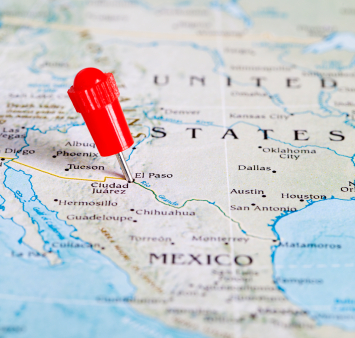EL PASO — The June 20 shooting deaths of a journalist, his wife, and their 21-year-old son in their home in Veracruz, México, underscore the assessment by a Washington human rights organization that México no longer has a free press.
Freedom House dropped México’s ranking to a “partly free” country citing the innumerable threats to the country’s media independence in the current climate of drug-war violence. México was listed as “partly free” in large part because of the self-censorship, violent and deadly attacks on journalists, and a feeling of fear that has taken over the nation.

(©iStockphoto/Labsas)
The murders of Miguel Ángel López Velasco, 55, a columnist for the daily newspaper Notiver and his son Misael López, a photographer for Notiver are more atrocities in an unrelenting series of criminal actions against Mexican journalists. Mexico’s National Commission on Human Rights estimates that in the past 10 years 83 Mexican journalists have been killed or have disappeared.
According to Freedom House, a free press plays a key role in sustaining and monitoring a healthy democracy. Only 17 percent of the world’s population lives in countries where a free press exists.
Lourdes Cárdenas, a veteran journalist and editor who now writes the México in Focus blog for the El Paso Times Web site, however maintains that México still has a free press since in-depth stories and articles about drug-war violence are still available to readers.
However, she agrees that press freedom is under constant threat. “As you probably know, most than 60 journalists have been killed in México since 2000 and the country is considered one of the most dangerous places to practice journalism in the world.”
She emphasized that despite the difficulties, Mexicans can still see “inspiring examples of courageous journalists in places such as Cd. Juárez, Torreón and Mexico City.”
Cárdenas says she gives much thought to the issues she covers. “I personally don’t write about the details of the drug cartel fights because I’m not an expert on that and I don’t want to be. I prefer to write about the consequences that this drug war is having on the lives of regular people, on the business, on the society in general and I don’t feel afraid about that.” Cárdenas said.
Since she doesn’t live in Mexico she is in a much more comfortable situation when compared to those who live in conflict zones such as El Paso’s neighboring border city, Cd. Juárez. “Journalists in México are extremely careful now when reporting on any issues related to the drug war,” she said.
Martín Orquiz, the editor of the public safety beat at El Diario de Juárez, says that freedom of the press continues to exist in México, but it must be exercised. “There are many places throughout the country where it isn’t though, for numerous reasons including, but not limited to the violence. Nuevo León, Tamaulipas and Guerrero are states where journalists and their performance has been greatly affected.”
In fact, drug war coverage in México is more limited than ever. Bribery, intimidation, and fear have dragged México into a “partly-free” zone alongside Venezuela, Honduras, and Cuba, one of the world’s worst rated countries according to Freedom House.
“We have a saying in México that says ‘Lo que no te mata te fortalece’ and I think that it applies for journalism, too,” says Cárdenas. “Journalism in México is going through a difficult time, but journalists from different media organizations are getting together to discuss ways to face the threats to freedom of the press.”
Everyone is affected by the violence, says Orquiz “It’s not just an evil that haunts journalists but society in general. Unfortunately, I believe journalists run twice the risk due to the nature of our jobs as we work around crime scenes, police, and government officials,” he said. “The most affected are the citizens of a society who have the right to be informed. A country’s population is the most affected when it’s freedom of press is unprotected. In an organized society it is important to have the facts and know what is happening, even if it’s just an overall summary of current events.”
When asked it he felt safe when on the clock, Orquiz said that was a very difficult question to answer. “At any moment one can be a victim of coincidence of circumstances or violence. In relationship to the job we [journalists] do, what we must try and do it the most professional way possible. I believe this is the way to keep ourselves safe, doing things professionally, a system we’ve adopted, at least here at El Diario.”
Journalists must learn how to cover “risky stories and react to threats” more than ever as long as this climate of violence and fear lurks over the country, says Cárdenas.

